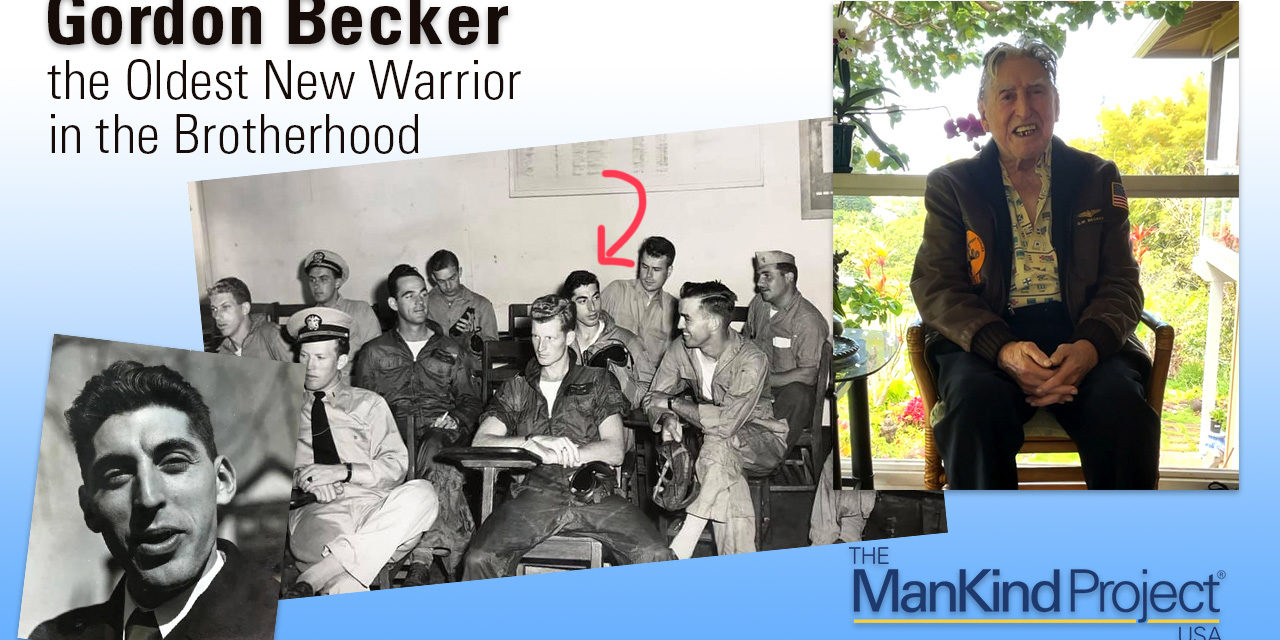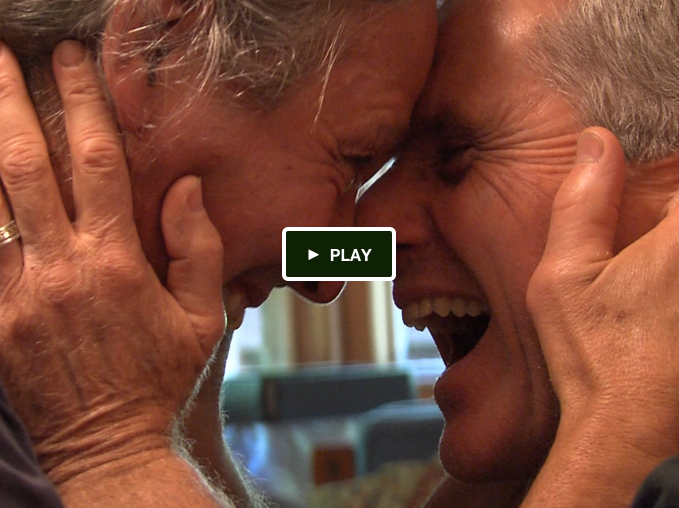Interview by Ed Fell, MKP Hawaii
Gordon Becker was born March 8, 1924. He completed the NWTA in Hawaii in October 2011.
As far as we can tell, he’s the oldest New Warrior in the Brotherhood.
Gordon’s Mission; To appreciate reality as it is and to serve others by showing how wonderful life is and how free you are when you realize that wants are not needs.
His CV makes for incredible reading; Born New York, NY. BS: physics and math., MA: Philosophy Education Psychology; PhD: Clinical Psychology; Licensed Clinical Psychologist Conn., Pennsylvania, Nebraska; Full Time Faculty: UNO, UCLA, Howard, Yale, Cowles Foundation Economic Research,; Naval Fighter Pilot WWII.; Elected City Council Waterford Conn.; Long Range Planning Operation Staff to Pres. GE; Senior Life Scientist Electric Boat Gen Dynamics Corp; Data Manager ITEK Corp; Consultant ENTELEK Corp; Founder and President Nebraska Zen Center; Founder and President Institute of Eastern Wisdom; Experimental Psychologist Naval Research Lab; Founder and President Nebraska Dharma Center; Married Andrea Binkley, 4 children, 8 grandchildren.
Gordon has been participating in I-Group and in Elder Connection groups in MKP. He lives on Maui, Hawaii, where he has grown connections with other New Warriors.
Full Transcript of the Conversation with Gordon Becker
Ed: Aloha, everybody. I’d like to introduce you to a dear friend who’s just a neighbor up the hill. And this is Gordon Becker.
Gordon Becker: Hi.
Ed: And Gordon maybe, we think, is the oldest initiated man in MKP. In March, he turned 98, born in 1924. [00:00:30] And I was asked to just give a quick interview about Gordon. And if you notice, he’s wearing his flight jacket. He was a pilot in World War II, has a couple of master’s degrees. He’s a very, very bright man. He’s still as sharp as a tack. And I just love you, Gordon.
Gordon Becker: It’s mutual.
Ed: We meet about every Sunday morning.
Gordon Becker: Yeah. Thank you for doing this.
Ed: So [00:01:00] Gordon, I think I’d like to ask a couple questions. One is, you did the weekend in 2011. And what was the main takeaway for you for that weekend?
Gordon Becker: Well, the main takeaway was you’re washing my feet, indoctrinating me as an elder. I’ve never had anybody do that before, so [00:01:30] that was… and you said I’d remember it. And you were right, I did.
Ed: Yeah. I mean, I don’t even remember.
Gordon Becker: Oh.
Ed: Yeah. And since the weekend, what’s the takeaway since you’ve done the weekend? How has your life been changed or enhanced?
Gordon Becker: Well, by having relationships with men that I respect and seeing how [00:02:00] they are able to get old and lose their abilities and not complain and take them, and still have good attitudes about living and life and each other and supporting each other.
Ed: You’ve expanded both the quantity and quality of your relationships with men since that weekend, yeah?
Gordon Becker: [00:02:30] Well, I’ve always had some good relations. Yeah. I’ve always had a few friends that I admire and that I respected.
Ed: So Gordon, you’re still pretty active on Zoom meetings and elder groups, and I imagine that’s been very fulfilling for you to have more and more and more relationships of real, authentic men.
Gordon: Yes, it has been. And I’ve been very impressed with the elders and how [00:00:30] they’re able to withstand pain and suffering and not complain about it.
Ed: I never hear you complain about it.
Gordon: No, well, no.
Ed: You’ve been in and out of the hospital, but you don’t dwell on your illness.
Gordon: No. Well, it doesn’t help, I mean.
Ed: Yeah.
Gordon: So right now, last week I raised the question in the group about whether we need [00:01:00] two agreements. One is that we’ll only use I statements.
Ed: Right.
Gordon: And two that you ask the person’s permission before you give any advice.
Ed: Okay.
Gordon: And I questioned that with a group, and I was surprised how they defended both of those. [00:01:30] And so they said that then, and some men said they were threatened just by bringing up the topic of having people criticize them or respond to them without their permission. Which means that these are elders who still don’t know how to take criticism, [00:02:00] which is amazing that they’ve had … And many of them have had 20, 30 years of MKP, and they haven’t learned how to take criticism. So I’m thinking I’m going to bring that up for all these elder groups and indicate that elders, if they haven’t learned how to take criticism yet, they should [00:02:30] go back to the damn I groups. They don’t belong in an elder group. They still belong in a young man’s group.
Ed: Okay.
Gordon: No, and I think to belong to an elder group, they should at least be able to take criticism and realize that other people’s opinions is just their opinions. They’re not orders. They don’t have to follow them. The other people don’t know what’s … And also to understand that when people [00:03:00] give their opinion, they don’t have to say, “In my opinion.” Whatever … That’s all they can do is give their opinion. They don’t know the truth. It’s not an order. And that they should learn by this time not to give away their power to other people and think just because they want you to do something you have to do it.
Ed: I think you’re getting into that second question I wanted to ask you of, what advice would you give to [00:03:30] younger men, you sitting in that elder chair, what do younger men need to know that you think would be important?
Gordon: Well, the main thing is learning to accept themselves, to be authentic. Yeah.
Ed: That’s it.
Gordon: To accept themselves as they are and not trying to be somebody they’re not. And also to recognize that what Buddha found out, the main discovery [00:04:00] was that wanting is what leads to suffering. Wanting is suffering. So to stop trying to make the world into your image, but to learn more how to adapt to the world and appreciate the world as it is.
Ed: Right. Right.
Gordon: So it’s thy way, not mine.
Ed: Right. Right.
Gordon: So that’s the only religious thing. Thy way, not my way.
Ed: If I were to [00:04:30] kind of summarize what I think your true religion is, it is of appreciation.
Gordon: Mm-hmm.
Ed: And what are you appreciative of in your life?
Gordon: Mainly my wife.
Ed: I knew you’re going to say that.
Gordon: And her love and compassion.
Ed: Yeah.
Gordon: And she’s such a-
Ed: She’s an amazing woman.
Gordon: She takes such good care of me.
Ed: Yeah.
Gordon: And she is so loving.
Ed: Yeah. Yeah.
Gordon: She never complains. And she … And all I [00:05:00] do is appreciate her. I don’t … She does all this work.
Ed: Yeah.
Gordon: And all I do is appreciate her. It’s easy for me. It’s not work. So I’m such a lucky man to have such a –
Ed: And I know when you’re in the hospital, even, and you’re suffering, you’re living in this place of appreciation of those nurses and doctors and attendants.
Gordon: Well, that’s true. I was impressed with them, because they’re [00:05:30] being overworked, and they’re risking their lives with COVID.
Ed: Yep.
Gordon: And they don’t complain.
Ed: Right. Right.
Gordon: They maintain that positive attitude.
Ed: Yeah.
Gordon: Wow.
Ed: Yep.
Gordon: There are a lot of good people in this world. And there are a lot of bad people, but there are a lot of good ones.
Ed: There you go.
Ed: And what advice would you give to younger men who are just coming up through MKP or all young men? What do they need to know from your seat as an elder and what you think is important for them to know?
Ed (00:15): Well, the main thing is that wanting is what causes suffering. That’s what the Buddha discovered. And so the learning to let go of your wants, learning to adapt to the world and appreciate the world as it is, rather than trying to get the world to be the way you want it, that’s the way to avoid.
Gordon (00:39): Okay.
Ed (00:42): To relax and love. Love is the greatest. That is appreciating things as they are.
Gordon (00:50): That’s what I appreciate. What I’ve learned from you is the value of appreciation. And you have a lot of … even though you’re 98, you’ve been in out of the hospital many times, you got some heart stuff and lung stuff, you still live with your religion is appreciation.
Ed (01:09): Yeah. I think that’s good.
Gordon (01:11): And now there’s a time to mention this beautiful bride of yours.
Ed (01:15): Oh, yeah.
Gordon (01:16): Who you appreciate so much.
Ed (01:17): Oh, yeah. Well, because she just gives, gives, gives and all I do is appreciate her.
Gordon (01:26): Yeah.
Ed (01:26): I don’t do anything but appreciate, and that’s all it takes and she never complains. And she has so much love for everybody and everything and beauty with her.
Gordon (01:39): This is what I’ve gotten most from you as an elder is that love for even just simply appreciating what is. Yeah. So thank you, Gordon. Glad to be your friend.
Ed (01:53): Glad you’re my friend. Glad to be your friend.
//end



